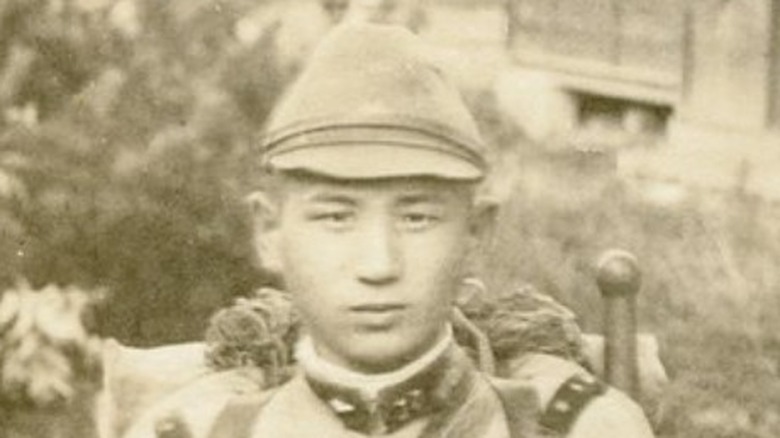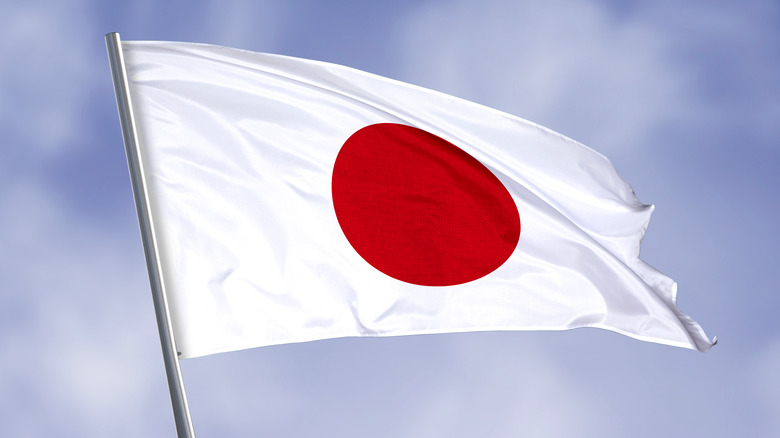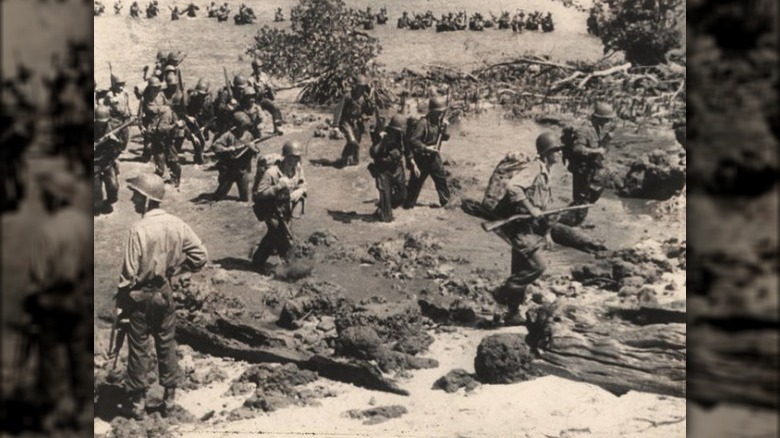Why A Japanese Imperial Army Soldier Didn't Know WWII Was Over For 30 Years
When the Japanese signed a peace treaty with the U.S. on September, 2 1945, World War II in the Pacific Theater came to a close (via the National Archives). The preceding nine months prior to Japan's surrender were some of the deadliest in the war, per the National World War II Museum. Expediting the peace treaty signing were two atomic bombs dropped by the United States on the Japanese cities of Hiroshima and Nagasaki. Those bombs killed tens of thousands of Japanese civilians, according to History. It was an alarming change of fortune for Japanese Imperial forces. After Pearl Harbor, Japan had the upper hand in the war, taking and holding territories at the time like Wake Island, the Philippines, Malaya, and others.
It was on just this kind of remote territory on the Indonesian island of Morotai that one Japanese army soldier failed to realize the war had ended until some three decades after his country surrendered. The story of Hiroo Onoda, a Japanese soldier who stayed at this post on a remote Philippine island for 29 years after the end of the war, is somewhat well known (per The New York Times). A Taiwanese national who served in the Japanese army named Teruo Nakamura, however, actually beat Onoda's record by 10 months.
Teruo Nakamura was a Taiwanese national
Teruo Nakamura enlisted in the Japanese imperial army in 1943. Shortly thereafter, Nakamura, a native of the Taiwanese indigenous group known as the Amis tribe, deployed to Morotai Island in the Dutch East Indies. Nakamura almost assuredly saw action when American and Australian forces attacked the island in what came to be known as the Battle of Morotai. Overwhelmed, most Japanese forces on Morotai surrendered. Others, such as Nakamura, retreated into the jungle to conduct guerrilla warfare against allied forces.
As Nakamura later told TIME Magazine, "My commanding officer told me to fight it out." Soon enough, communication was lost between Tokyo and Morotai, and Nakamura and his unit were separated. For this reason, Nakamura never knew Japan had surrendered. Unaware the war was over, Nakamura lived and survived for some 30 years deep in the jungle. Back home in Japan, Nakamura was declared dead. From his jungle retreat, Nakamura observed aircraft flying overhead and assumed the conflict was still ongoing, as he later explained to Taipei Times.
Nakamura grew his own food
For more than a decade, Nakamura and a small group of Japanese soldiers survived in the jungle. Eventually, and possibly because his life was threatened by the other soldiers, Nakamura struck out on his own. He grew up impoverished in harsh conditions and could survive on very little. He built a grass hut and survived off bananas. He also grew his own potatoes (via TIME). In 1945, allied forces dropped flyers across Morotai to inform remaining troops the war was over. Nakamura and his fellow soldiers disregarded them as war-time propaganda, according to Taipei Times.
In the 30 long years Teruo Nakamura spent in hiding, he cooked only later at night so as not to attract attention. He also fished and made himself an abacus. He kept track of time with the moon cycle, and through tying knots in a rope. Nakamura was reportedly sighted by a Morotai native who then alerted the authorities. Naked, he was lured from hiding by Japanese airmen who sang the Japanese national anthem and waved the rising sun flag, according to TIME.
Declared fit, when Nakamura returned home he discovered his wife had remarried. "I calmly stayed alive," Nakamura later said, remembering his life in the jungles of Morotai (per Taipei Times). As late as 2005, two men in their eighties reportedly declared themselves Japanese soldiers who were still hiding out in the Philippines. They disappeared before the media and the Japanese authorities could arrive (via The Guardian).


